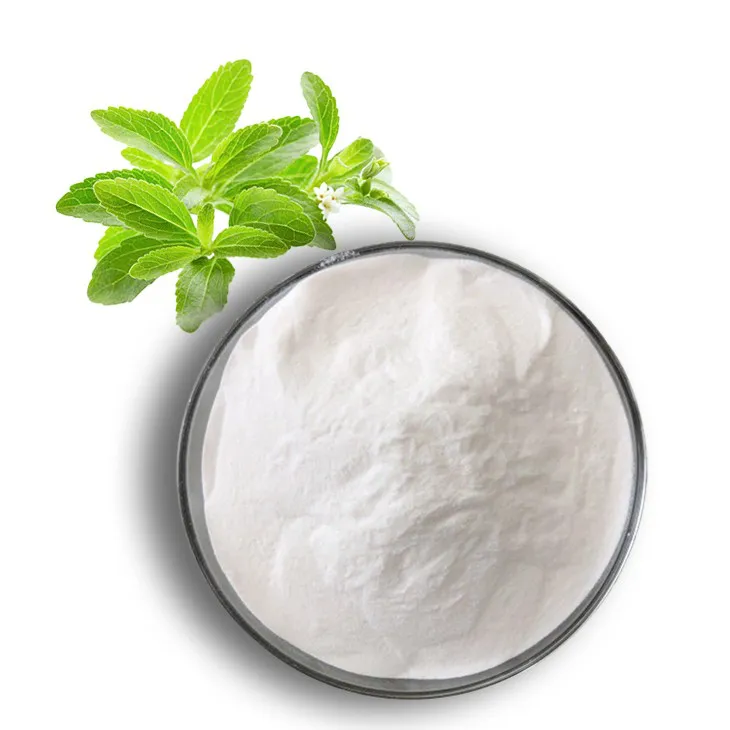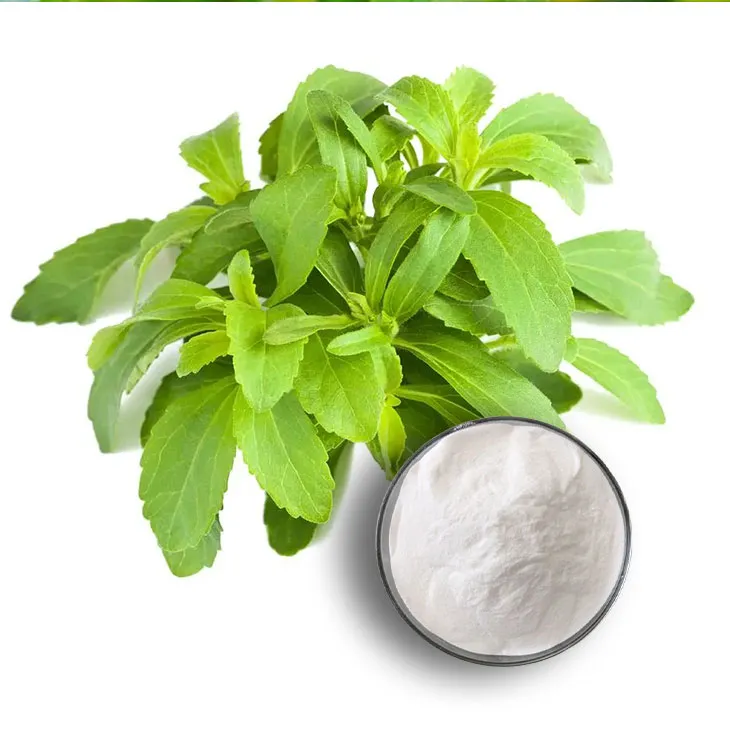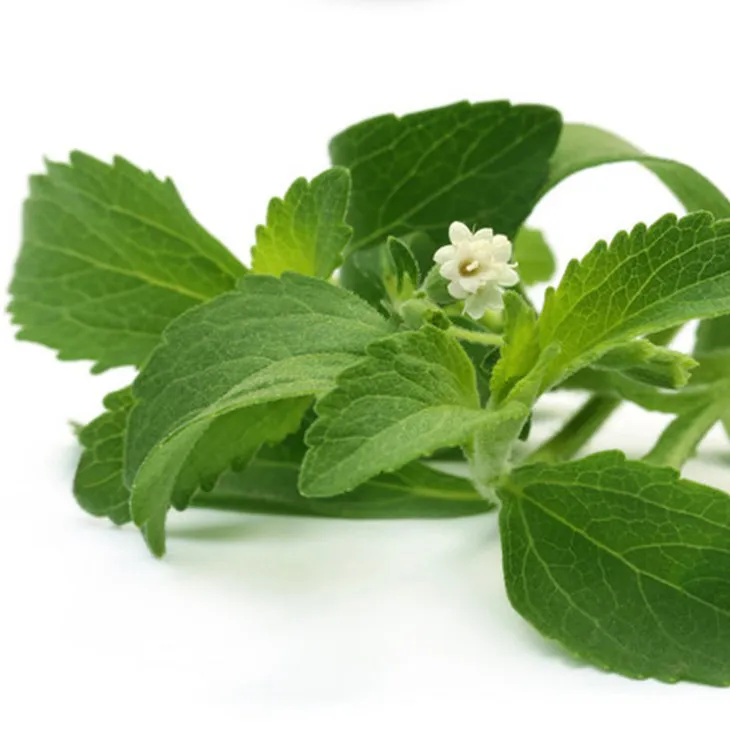- 0086-571-85302990
- sales@greenskybio.com
Active components in stevia extract.
2024-11-27

1. Introduction
Stevia Extract has been increasingly studied due to its various potential health benefits. The active components within it are the key factors contributing to these effects. Understanding these active ingredients is crucial for both its application in the food industry as a sweetener and in the field of medicine for potential therapeutic uses.

2. Steviol Glycosides
Steviol glycosides are the most prominent active components in Stevia Extract. Among them, Rebaudioside A stands out. It is known for its remarkable sweetness, which is many times sweeter than sucrose. This property makes it an excellent low - calorie sweetener. Rebaudioside A can be used in a variety of food and beverage products as a substitute for traditional high - calorie sweeteners, such as sugar.
Other steviol glycosides also contribute to the overall sweetening effect of Stevia Extract. They are generally considered safe for consumption, with regulatory bodies around the world setting limits on their use to ensure safety. For example, in the European Union, there are specific regulations regarding the maximum amount of steviol glycosides that can be added to food products.

3. Phenolic Acids
In addition to steviol glycosides, stevia extract contains phenolic acids. These phenolic acids play a significant role in the antioxidant capacity of the extract. Antioxidants are substances that can prevent or slow down the damage to cells caused by free radicals.
3.1. Prevention of Lipid Peroxidation
One of the important functions of phenolic acids in stevia extract is to prevent lipid peroxidation. Lipid peroxidation is a process in which lipids in cell membranes are oxidized, which can lead to cell damage. By inhibiting this process, phenolic acids help protect cells from oxidative damage. This is especially important in maintaining the integrity of cell membranes and overall cell function.
3.2. Protection Against Oxidative Damage
Phenolic acids also protect cells from oxidative damage in a broader sense. They can scavenge free radicals, which are highly reactive molecules that can cause damage to DNA, proteins, and other cellular components. By neutralizing these free radicals, phenolic acids contribute to the overall health of the body.

4. Cardiovascular Health Implications
Stevia extract has potential implications for cardiovascular health. Some of its active ingredients may have beneficial effects on blood pressure and lipid profiles.
4.1. Blood Pressure Reduction
It is believed that certain components in stevia extract may help in reducing blood pressure. However, the exact mechanisms are still under investigation. One possible mechanism is through the modulation of certain hormones or signaling pathways related to blood pressure regulation. For example, it may interact with the renin - angiotensin - aldosterone system, which is a key regulator of blood pressure in the body.
4.2. Improvement of Lipid Profiles
Stevia extract may also play a role in improving lipid profiles. This could include reducing levels of LDL cholesterol (the "bad" cholesterol) and increasing levels of HDL cholesterol (the "good" cholesterol). The active components in stevia may affect lipid metabolism in the liver or other tissues, although more research is needed to fully understand these mechanisms.

5. Interaction with Appetite - Regulating Hormones
Another interesting aspect of stevia extract's active components is their potential interaction with hormones related to appetite regulation. Hormones such as leptin and ghrelin play important roles in controlling appetite and food intake.
There is evidence to suggest that stevia may affect the levels or signaling of these hormones. This could potentially lead to reduced food cravings and better control of body weight. For example, it may increase the sensitivity of the body to leptin, which is a hormone that signals satiety. By doing so, it may help individuals feel full faster and consume less food, which could contribute to weight management.
6. Antimicrobial and Anti - Fungal Activities
The active ingredients in stevia extract also possess antimicrobial and anti - fungal activities. This property has potential applications in both the pharmaceutical and food industries.
6.1. Pharmaceutical Applications
In the pharmaceutical industry, the antimicrobial and anti - fungal properties of stevia extract could be used in the development of new drugs or treatments. For example, it may be used in topical formulations to treat skin infections caused by bacteria or fungi. It could also be explored for its potential use in treating internal infections, although more research is needed in this area.
6.2. Food Industry Applications
In the food industry, the antimicrobial and anti - fungal activities of stevia extract can be used for food preservation. It can help prevent the growth of spoilage - causing microorganisms such as bacteria and fungi in food products. This can extend the shelf life of food items and reduce the need for artificial preservatives. However, regulatory requirements regarding the use of stevia extract for food preservation need to be carefully considered and followed.
7. Conclusion
In conclusion, the active components in stevia extract, including steviol glycosides, phenolic acids, and other substances, have a wide range of potential benefits. They offer possibilities for the development of low - calorie sweeteners, contribute to antioxidant capacity, have implications for cardiovascular health, may interact with appetite - regulating hormones, and possess antimicrobial and anti - fungal activities. However, further research is still needed to fully understand the mechanisms underlying these effects and to ensure the safe and effective use of stevia extract and its active components in various applications.
FAQ:
What are the main active components in stevia extract?
Steviol glycosides are the predominant active components in stevia extract. Among them, rebaudioside A is a major steviol glycoside. Additionally, phenolic acids are also present in stevia extract.
How does rebaudioside A in stevia extract function?
Rebaudioside A has remarkable sweetness and can be used as a low - calorie sweetener.
What role do phenolic acids in stevia extract play?
Phenolic acids in stevia extract play a role in the antioxidant capacity. They can prevent lipid peroxidation and protect cells from oxidative damage.
How might stevia extract's active ingredients affect cardiovascular health?
Some of the active ingredients in stevia extract may help in reducing blood pressure and improving lipid profiles, though the exact mechanisms are still under investigation.
Can stevia extract's active components affect body weight?
The active components of stevia may interact with hormones related to appetite regulation, which could potentially lead to reduced food cravings and better control of body weight.
Related literature
- The Active Components of Stevia and Their Health Benefits"
- "Stevia Extract: Composition, Active Ingredients and Potential Applications"
- "Unraveling the Role of Stevia Active Components in Metabolism"
- ▶ Hesperidin
- ▶ Citrus Bioflavonoids
- ▶ Plant Extract
- ▶ lycopene
- ▶ Diosmin
- ▶ Grape seed extract
- ▶ Sea buckthorn Juice Powder
- ▶ Fruit Juice Powder
- ▶ Hops Extract
- ▶ Artichoke Extract
- ▶ Mushroom extract
- ▶ Astaxanthin
- ▶ Green Tea Extract
- ▶ Curcumin
- ▶ Horse Chestnut Extract
- ▶ Other Product
- ▶ Boswellia Serrata Extract
- ▶ Resveratrol
- ▶ Marigold Extract
- ▶ Grape Leaf Extract
- ▶ New Product
- ▶ Aminolevulinic acid
- ▶ Cranberry Extract
- ▶ Red Yeast Rice
- ▶ Red Wine Extract
-
Moringa powder
2024-11-27
-
Sophora Japonica Flower Extract
2024-11-27
-
Honeysuckle Pollen
2024-11-27
-
Curcumin
2024-11-27
-
Lemon Extract
2024-11-27
-
Purple Sweet Potato Extract
2024-11-27
-
Agaricus Blazei Extract
2024-11-27
-
Sea buckthorn oil
2024-11-27
-
Golden Seal Extract
2024-11-27
-
Astaxanthin
2024-11-27





















